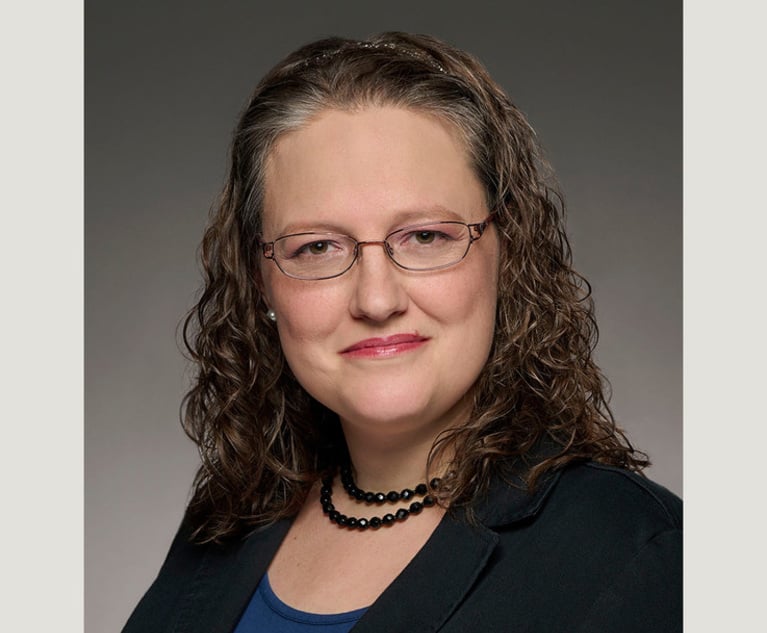In Parting Shot, Shawe Hits Actions of Del. Courts as Reason for TransPerfect's Nev. Move
Explaining his decision to reincorporate his business in Nevada, TransPerfect co-founder and CEO Philip R. Shawe returned to Delaware last week to deliver a parting shot to the state's legal establishment, saying the Delaware Court of Chancery was too quick to order the profitable translation software company to the auction block.
October 23, 2018 at 05:45 PM
5 minute read
 Philip Shawe.
Philip Shawe.
Explaining his decision to reincorporate his business in Nevada, TransPerfect co-founder and CEO Philip R. Shawe returned to Delaware last week to deliver a parting shot to the state's legal establishment, saying the Delaware Court of Chancery was too quick to order the profitable translation software company to the auction block.
Despite ultimately prevailing in what came to be known as one of the most vexing and contentious cases in the recent history of the Chancery Court, Shawe said last week that the 2015 decision to force the sale of the deadlocked, but profitable, translation software company could have wide-ranging ramifications for Delaware, which sells itself to the corporate and startup communities as a stable, predictable court system.
“If that's the standard, you could dissolve any company in America,” Shawe said at an Oct. 17 event hosted by the Wilmington History Society.
The critique has gained some traction, including with one state Supreme Court justice, who said Chancellor Andre Bouchard had gone “too far too fast” in appointing a custodian to oversee a public auction. However, the bulk of the state's corporate bar has lined up behind the chancellor, arguing that he followed the proper blueprint for resolving corporate deadlock under Delaware law.
The dispute centers on a rarely used provision of Delaware law, which grants the Chancery Court authority to breakup firms when their directors have reached a point of permanent impasse. Under the statute, codified in Section 226 of the Delaware General Corporation Law, a custodian is required to continue the business of a corporation, “except when the court shall otherwise order.”
Shawe, who initially opposed TransPerfect co-founder Elizabeth Elting's petition to dissolve the company, argued that Bouchard opted to impose an “unpredictable application of Delaware law,” when other, less-intrusive steps could have been taken to resolve TransPerfect's corporate deadlock.
Earlier this year, Shawe won his bid to purchase Elting's 50 percent stake for $385 million, finally putting to rest a four-year legal saga between the former business partners and one-time finances over control of the company that they had started together out of a college dorm room. An outspoken critic of the Delaware judiciary, Shawe in late summer changed TransPerfect's state of incorporation to Nevada, in part so that he would never have to litigate its internal corporate disputes in Delaware again.
“I think there's a lot Delaware can learn from this case, if it wants to be a hospitable home for entrepreneurs,” he said in an interview.
Shawe said in an interview that Bouchard's sale order had stretched the company's resources and shaken the confidence of his senior management team. Instead, Shawe argued, Bouchard should have allowed the custodian to expand the company's board in order to reach an internal resolution.
Last February, Delaware Supreme Court Justice Karen L. Valihura had recommended the appointment of a custodian in her lone dissent to a 4-1 opinion of the high court upholding the sale. In her opinion, Valihura said that Section 226 had never before been used to sell stock over a shareholder's objection.
“The absence of authority grounded in the statute, the conceded absence of any similar cases under Section 226, and our common law's strong preference for the least intrusive remedies in cases involving court-appointed custodians suggest that the chancellor went too far too fast in ordering the modified auction,” she wrote.
Shawe has since seized on Valihura's dissent to argue that Bouchard's decision had upset the stability that Delaware corporate law is known for.
But Francis G.X. Pileggi, vice chair of Eckert Seamans Cherin & Mellott's commercial litigation practice, said Section 226 had functioned as it should in a case of corporate deadlock. Pileggi acknowledged that Valihura's dissent had a “substantial amount of merit,” but he said that Section 226 cases are, by their nature, “almost inherently unpredictable.”
“Whenever there's discretion involved, one vice chancellor may reach a different conclusion than another vice chancellor,” he said. “The predictability is that 226 is available to break the deadlock. The unpredictability is how the court decides to break the deadlock.”
Section 226, Pileggi said, only applies to a small group of tightly held companies that incorporate in Delaware, and its application in one case would not have much affect on the broader business community.
It is hard to predict the outcome of any lawsuit, he said, but Delaware has a history of applying the statute on a case-by-case basis and would be better equipped to handle the cases than its counterparts.
“If you don't know how the Delaware court is going to rule,” he said, “it's even more difficult to predict how another court is going to rule outside of Delaware.”
This content has been archived. It is available through our partners, LexisNexis® and Bloomberg Law.
To view this content, please continue to their sites.
Not a Lexis Subscriber?
Subscribe Now
Not a Bloomberg Law Subscriber?
Subscribe Now
NOT FOR REPRINT
© 2025 ALM Global, LLC, All Rights Reserved. Request academic re-use from www.copyright.com. All other uses, submit a request to [email protected]. For more information visit Asset & Logo Licensing.
You Might Like
View All

Here's What Corporate Litigators Expect Delaware Courts to Address in 2025
6 minute read
Tesla, Musk Appeal Chancery Compensation Case to Delaware Supreme Court
2 minute read
Fed Judiciary Panel Mulls Authority to Ban In-State Bar Admission Requirements
Trending Stories
- 1'It's Not Going to Be Pretty': PayPal, Capital One Face Novel Class Actions Over 'Poaching' Commissions Owed Influencers
- 211th Circuit Rejects Trump's Emergency Request as DOJ Prepares to Release Special Counsel's Final Report
- 3Supreme Court Takes Up Challenge to ACA Task Force
- 4'Tragedy of Unspeakable Proportions:' Could Edison, DWP, Face Lawsuits Over LA Wildfires?
- 5Meta Pulls Plug on DEI Programs
Who Got The Work
Michael G. Bongiorno, Andrew Scott Dulberg and Elizabeth E. Driscoll from Wilmer Cutler Pickering Hale and Dorr have stepped in to represent Symbotic Inc., an A.I.-enabled technology platform that focuses on increasing supply chain efficiency, and other defendants in a pending shareholder derivative lawsuit. The case, filed Oct. 2 in Massachusetts District Court by the Brown Law Firm on behalf of Stephen Austen, accuses certain officers and directors of misleading investors in regard to Symbotic's potential for margin growth by failing to disclose that the company was not equipped to timely deploy its systems or manage expenses through project delays. The case, assigned to U.S. District Judge Nathaniel M. Gorton, is 1:24-cv-12522, Austen v. Cohen et al.
Who Got The Work
Edmund Polubinski and Marie Killmond of Davis Polk & Wardwell have entered appearances for data platform software development company MongoDB and other defendants in a pending shareholder derivative lawsuit. The action, filed Oct. 7 in New York Southern District Court by the Brown Law Firm, accuses the company's directors and/or officers of falsely expressing confidence in the company’s restructuring of its sales incentive plan and downplaying the severity of decreases in its upfront commitments. The case is 1:24-cv-07594, Roy v. Ittycheria et al.
Who Got The Work
Amy O. Bruchs and Kurt F. Ellison of Michael Best & Friedrich have entered appearances for Epic Systems Corp. in a pending employment discrimination lawsuit. The suit was filed Sept. 7 in Wisconsin Western District Court by Levine Eisberner LLC and Siri & Glimstad on behalf of a project manager who claims that he was wrongfully terminated after applying for a religious exemption to the defendant's COVID-19 vaccine mandate. The case, assigned to U.S. Magistrate Judge Anita Marie Boor, is 3:24-cv-00630, Secker, Nathan v. Epic Systems Corporation.
Who Got The Work
David X. Sullivan, Thomas J. Finn and Gregory A. Hall from McCarter & English have entered appearances for Sunrun Installation Services in a pending civil rights lawsuit. The complaint was filed Sept. 4 in Connecticut District Court by attorney Robert M. Berke on behalf of former employee George Edward Steins, who was arrested and charged with employing an unregistered home improvement salesperson. The complaint alleges that had Sunrun informed the Connecticut Department of Consumer Protection that the plaintiff's employment had ended in 2017 and that he no longer held Sunrun's home improvement contractor license, he would not have been hit with charges, which were dismissed in May 2024. The case, assigned to U.S. District Judge Jeffrey A. Meyer, is 3:24-cv-01423, Steins v. Sunrun, Inc. et al.
Who Got The Work
Greenberg Traurig shareholder Joshua L. Raskin has entered an appearance for boohoo.com UK Ltd. in a pending patent infringement lawsuit. The suit, filed Sept. 3 in Texas Eastern District Court by Rozier Hardt McDonough on behalf of Alto Dynamics, asserts five patents related to an online shopping platform. The case, assigned to U.S. District Judge Rodney Gilstrap, is 2:24-cv-00719, Alto Dynamics, LLC v. boohoo.com UK Limited.
Featured Firms
Law Offices of Gary Martin Hays & Associates, P.C.
(470) 294-1674
Law Offices of Mark E. Salomone
(857) 444-6468
Smith & Hassler
(713) 739-1250






